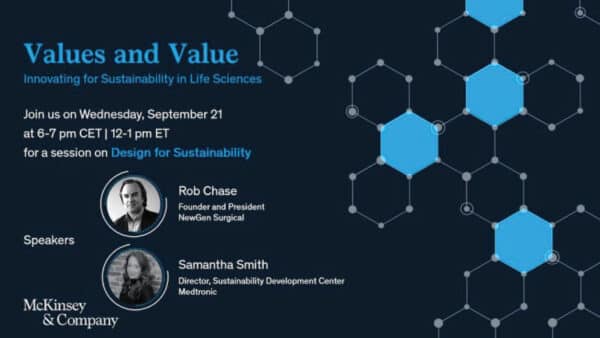ESG Leaders roundtable discussion on making MedTech more sustainable

McKinsey’s Values and Value event series, where ESG leaders from across the Life Sciences industry discussed trends, questions, hot topics, accomplishments, and challenges that arise in the path to improving the industry’s environmental and social impact held a panel, Design for Sustainability, on September 21, 2022.
Rob Chase, along with Samantha Smith, Director at Medtronic’s Sustainability Development Center, discussed the driving catalysts behind MedTech’s acceleration towards more sustainable products and packaging, challenges organizations are facing in designing for sustainability, and key levers to pull when designing products and packaging today.
McKinsey & Company is a single, global partnership that works with clients to help workforces innovate more sustainably and achieve lasting gains in performance that will thrive for this generation and the next. United by a strong set of values, including a deep commitment to diversity, and a common purpose: to create positive, enduring change in the world, McKinsey & Company is committed to social responsibility and environmental sustainability.
Throughout the Values and Value event series, a wide range of essential ESG topics for Life Sciences is covered: why sustainability matters, the path for carbon and plastic neutrality, climate risk mitigation strategies, the route to reducing health inequity, a role model for business resilience and diversity, SEC disclosure and ESG reporting & transparency, and decarbonization. Today’s topic was specifically on design for sustainability in medical products and packaging. The topic of product positioning on the market was discussed as well.
In the roundtable discussion, McKinsey resurfaced the urgency to act, particularly in the healthcare sector. Around 14,000 tons of waste per day is generated by healthcare facilities in the U.S. alone, with most of it being disposed of in landfills or by incineration, and the pharma industry continues to emit 55% more greenhouse gases than the automotive sector. With that, McKinsey facilitated conversation around ways MedTech centric DfS (design for sustainability) levers are able to be scaled across a portfolio. These include: switching formats and materials, eliminating materials of concern, reducing material, piece count reduction, and design for repair and disassembly.
Samantha Smith spoke of Medtronic’s efforts to move towards environmental stewardship beginning with the Product Stewardship and Sustainability Development Center at Medtronic. With their focus currently on packaging, Medtronic is making efforts to continuously develop and introduce innovative and sustainable products and packaging with the goal of improving patient and community health while reducing life-cycle environmental impact. They leverage eco-design, circularity, and recyclability to meet regulations and customer requirements, including the elimination of materials of concern. Samantha Smith states that Medtronic’s has committed to a 25% packaging waste reduction on targeted high-volume product lines by FY25 and a 35% reduction in paper consumption through IFU minimization by FY27. These goals are expected to be achieved through size reduction on product packaging such as their tri-staple blister downgauging project as well as converting all paper IFU’s to eIFU’s.
Speaking for NewGen Surgical, Rob Chase spoke on the founding mission of NewGen Surgical to decarbonize healthcare with the use of biobased materials to create sustainable products for the medical industry. By switching from a linear model of nonrenewable inputs to a circular economic model of biobased materials, NewGen Surgical works upstream with design and materials to facilitate smart purchasing decisions. The main focus of NewGen Surgical is to mitigate and eliminate single-use plastic and carbon emissions through their reinvention of FDA class one medical devices. Through their Smart, Sustainable Design program, NewGen Surgical produces products that move away from petroleum materials to shifting to materials that grow above ground without compromising clinical performance.
With the exposure of this McKinsey roundtable event, MedTech companies have the ability to look at new and innovative ways to decarbonize the healthcare industry beginning with NewGen Surgical products. With over a million tons of single-use plastic waste generated throughout healthcare annually, NewGen Surgical offers solutions to not just reducing plastic waste but eliminating it altogether.